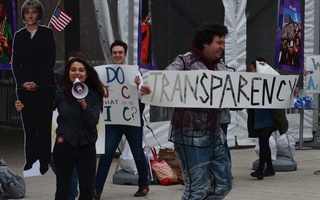The Undergraduate Council will provide Costco sandwiches to undergraduates later this week, after a proposal from the Student Relations Committee passed during the Council’s Sunday meeting.
The legislation, sponsored by Student Relations Committee Chair Yasmin Z. Sachee ’18, allocates $1,100 to fund a College-wide “healthy study break.”
“There have been a lot of complaints from students about food and not being well-fed throughout the week,” Sachee said, referring to an ongoing strike by Harvard University Dining Services workers that began around two weeks ago. “We want to do our bit.”
The UC voted 45-3 earlier this month to endorse the HUDS workers in their intent to strike. UC President Shaiba Rather ’17 and UC Vice President Daniel V. Banks ’17 met with University Director of Employee and Labor Relations Paul R. Curran last week to discuss students’ concerns about the strike.
Representatives from Harvard Student Labor Action Movement, a student group that supports the HUDS strike, presented before the Council earlier this month preceding the endorsement vote.
Originally, the study break legislation drew funding from the Student Relations Committee budget, the Freshman Class Committee budget, and the Council’s $10,000 Emergency Fund. However, representatives overwhelmingly voted in favor of an amendment proposed by Education Committee Vice Chair Eduardo A. Gonzalez ’18 to use the Emergency Fund alone.
Sachee said she hoped platters of sandwiches would be made available one evening this week in each House’s dining hall and in Annenberg.
The legislation passed with just one abstention.
Also at the meeting Sunday, the Rules Committee stirred a contentious debate with a proposal, sponsored by Rules Committee Chair Cameron K. Khansarinia ’18, to establish formal caucuses on the Council.
The policy, a vote on which was delayed until next week, would have amended the Council’s bylaws to allow “racial, cultural, ethnic, religious, sexual orientation, or gender identity group[s]” of three or more representatives to be recognized as a formal caucus with the power to release statements and endorse legislation.
“Caucuses are not simply to advocate for the identities that we hold, but they are to keep us in check and keep us in touch with these communities,” Dudley House representative Laila M. Smith ’18 said.
The Council currently has several informal caucuses—including the BGLTQ caucus, the black caucus, and the Latinx caucus—but none are official institutions of the UC.
Several representatives, however, raised objections to the legislation. UC Finance Committee Chair William A. Greenlaw ’17 objected to the proposal’s exclusion of first-generation students and low-income students from being a group that could apply to be a caucus.
Greenlaw instead proposed an amendment to allow “any otherwise under-represented groups” to be eligible for caucus recognition.
Though the amendment passed, others still had objections to the policy. Kirkland House representative Diana Im ’17 argued that requiring three representatives to be a member of a group to become a caucus could leave out particularly under-represented groups if they don’t have three members on the Council.
Banks also objected to the legislation, arguing that the current system, in which caucuses exist but aren’t formally recognized under the Council’s bylaws, was sufficient.
“I think what this [legislation] does is that it makes it harder for any group to form a caucus on the Undergraduate Council,” Banks said. “We have caucuses right now. Institutionalizing it doesn't do anything to change that.”
Ultimately, the Council voted to table the legislation and will consider the proposal again next week.
—Staff writer Brian P. Yu can be reached at brian.yu@thecrimson.com. Follow him on Twitter @brianyu28.
Read more in College News
Fly-By Temporarily Closes Due to Unsafe Food TemperatureRecommended Articles
-
 UC Begins Debate Over Student Organization Comp Processes
UC Begins Debate Over Student Organization Comp Processes -
UC Launches New Grant for 'House-Centered' PartiesThe Undergraduate Council will fund $1,000 worth of non-alcoholic “house-centered parties” this semester, due to a new Student Initiatives Committee policy.
-
 UC To Provide Tampons in Freshman Dorms
UC To Provide Tampons in Freshman Dorms -
 UC Passes Caucus Legislation Semester After Defeat
UC Passes Caucus Legislation Semester After Defeat -
 UC to Pilot Gender-Focused Freshman Study Breaks
UC to Pilot Gender-Focused Freshman Study Breaks













